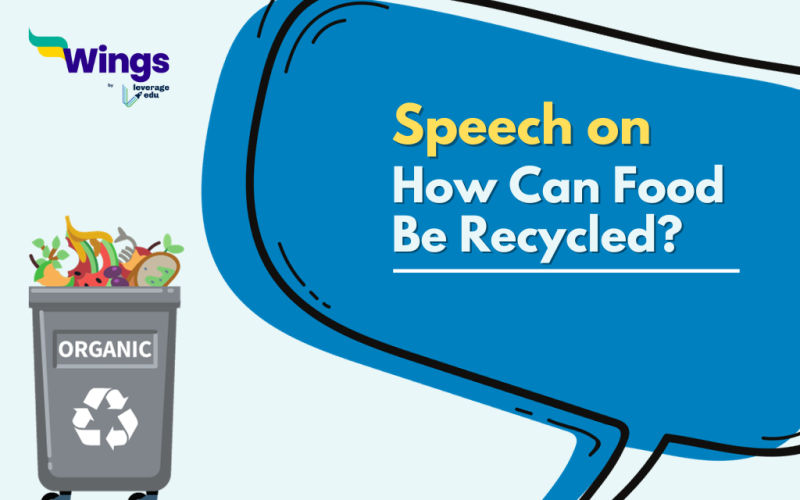Have you ever considered how important it is to recycle food? Why, in your opinion, is food recycling necessary? Is the output of agriculture in limited supply? We must first recognize that the issue is more complex than just the shortage. Food is a necessary component for the survival of both human and animal bodies. Without food, a typical human may survive up to two weeks without eating, whereas an animal can survive up to 5 to 14 days, depending on the species. Second, the world’s growing demand and the loss of natural resources make recycling crucial. Food recycling is crucial for maintaining sustainable and ethical waste management practices, enhancing soil fertility, protecting the environment, and conserving natural resources. Today, we will discuss a 2-minute speech on how can food be recycled.
Also Read: 160+ Best and Easy English Speech Topics for Students
2-Minute Speech on How Can Food Be Recycled
‘Good morning and welcome to all my friends and teachers. Today, I stand before you to present my speech on how can food be recycled. Food is our basic requirement and the level at which we are consuming it, there will come a time when the entire world will have to go hungry. On one side, there is a section of society that has access to 3 to 4 times of meals per day, and on the other, there are people who are so deprived of food that they hardly eat once in two days.
Also Read: Speech on Beauty Is In The Eye of The Beholder
Why is Food Recycling Important?
One of the best reasons why food recycling is important is that it will reduce the greenhouse gas emissions (GHGs) in the atmosphere.
- The food waste we put in landfills produces methane gas, which is one of the significant contributors to greenhouse gas emissions.
- We can reduce this methane gas by recycling food waste through composting or anaerobic digestion. This way, we can also convert food waste into a renewable energy fuel, Biogas.
- Food production requires a substantial amount of natural resources like land, water, energy, etc. If we practice food recycling, the nutrients in the food can be returned to the soil. This will contribute to healthier soils and will reduce the requirement for synthetic fertilizers.
- Food recycling will have economic benefits as the resources can be reused, instead of being disposed of.
- By recycling food, we can encourage and raise awareness about food recycling programs and the environmental effects of food waste.
- This practice can also result in cost savings for organizations associated with waste disposal, as there will be fewer and more efficient ways to dispose of food.
Now comes the big, question;
How Can Food Be Recycled?
Some of the simple food recycling practices are industrial uses, composting, and animal feeding.
- Composting is a natural process to convert organic matter into a nutrient-rich soil conditioner.
- Animals can be fed with the leftover food, which is safe for consumption.
- Instead of wasting food, it can be processed in industrial processes for the production of bioenergy, such as biofuels, biogas, or any other environmentally friendly product.
Some other food recycling measures are vermicomposting, community-scale digesters, anaerobic digestion, etc.,
Call to Action
It is high time for us to effectively implement these strategies to ensure sustainability for future generations. Starting from our homes, we can focus on food recycling practices to make sure we are not contaminating the environment.
Also Read: 1-Minute Speech on Fear of Mission Out (FOMO)
10 Lines to Add in Food Recycle Topics
Here are 10 lines on food recycling. Feel free to add them to your food recycling or any related writing or speech topics.
- Rather than throwing away food, we can serve it to the needy people.
- Animals can be fed with safe food.
- Food recycling is an environmentally friendly activity as it will reduce the emission of methane gas into the atmosphere.
- Compost from recycling enhances soil quality.
- Food recycling will put less burden on the resources used in food production, such as energy, water, land, etc.
- Food recycling programs will raise awareness and educate people about food waste and its environmental impact.
- Developing food recycling infrastructure will generate employment.
- We can save food for future generations.
- NGOs can encourage people to actively participate in food recycling activities.
- Food recycling can produce environmentally friendly products like biofuel, biogas, etc.
Also Read: Speech on Is There Value in Homework
Also Read: How to Prepare for UPSC in 6 Months?
FAQs
Ans: Some of the simple practices to recycle food are composting, animal feeding, vermicomposting, and animal feeding.
Ans: Food items that can be recycled include; raw or cooked meat and fish; fruits and vegetables; non-liquid dairy products; eggs; rice and beans; bread and cakes, etc.
Ans: Recycling food for industrial activities can produce environmentally friendly bioenergy, such as biofuels, biogas, etc
Related Articles
For more information on such interesting speech topics for your school, visit our speech writing page and follow Leverage Edu.
 One app for all your study abroad needs
One app for all your study abroad needs













